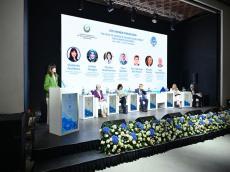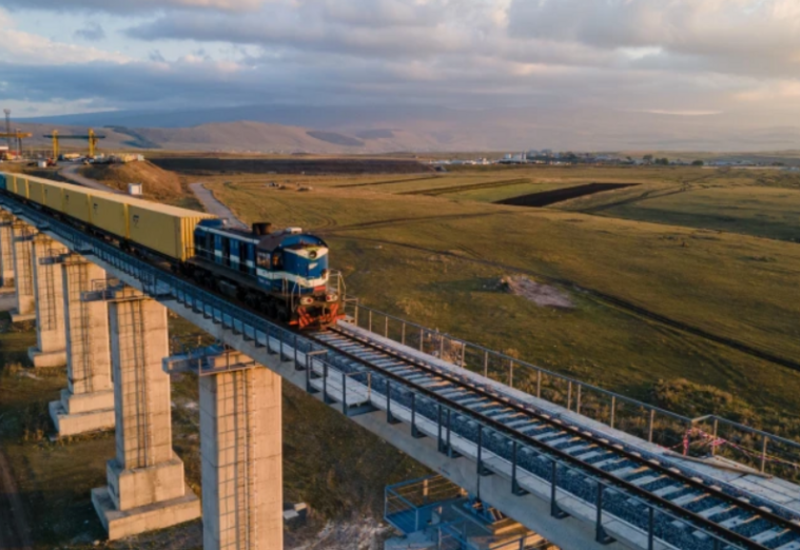|
|
TODAY.AZ / World news
Panel on “Women’s role in human development for climate resilience” held at ECO Women’s Forum
02 July 2025 [18:53] - TODAY.AZ

As part of the Economic Cooperation Organization’s (ECO) Women’s Forum held in Lachin, a panel session titled “Women’s role in human development for climate resilience” took place, moderated by Vladanka Andreeva, the UN Resident Coordinator in Azerbaijan, Azernews reports.
During the session, Leman Yenigün, Deputy Minister of Family and Social Services of Turkiye, highlighted her country’s climate change strategy, which was presented at COP29. She emphasized Turkiye’s efforts to increase women’s representation in the green energy sector under the patronage of Turkiye’s First Lady, Emine Erdo?an.
“We are committed to empowering women in renewable energy initiatives,” Yenigün stated.
Juldiz Suleymanova, member of Kazakhstan’s parliament and the National Commission on Women and Family Demographic Policy, spoke about Kazakhstan’s contributions to climate change mitigation under the Paris Agreement. She noted that the country is developing a strategy to achieve carbon neutrality by 2060, including new educational programs aimed at training specialists across various sectors of the energy and oil industries.
Elnur Nasibov, Chairman of Azerbaijan’s Education Development Foundation, stressed the importance Azerbaijan places on promoting gender equality. He noted close cooperation between the Ministry of Science and Education and the State Committee on Family, Women, and Children’s Issues. “Currently, 60% of students in Azerbaijan are girls, with 36% of them enrolled in vocational education. Our goal is to increase this number to 40%. Additionally, 61% of education loans are utilized by female students,” Nasibov highlighted.
Professor Mehmet Akif Kireçci, President of the ECO Educational Institute, acknowledged the organization’s substantial investments in education but pointed out ongoing challenges. “Women make up 94% of participants in secondary and other education levels, yet globally, 136 million young girls remain out of school. We must also invest in families,” he said.
Mihaela Ionescu, representative of the United Nations Women’s Regional Office for Europe and Central Asia, praised the professional conduct of last year’s COP29 and marked this year’s anniversary of the Beijing Platform for Action. “This is a critically important document. When funds are allocated to women, the entire economy benefits,” she remarked.
Farej Huseynbayov, Senior Project Specialist of the Asian Development Bank’s Azerbaijan Office, emphasized the bank’s ongoing commitment to women’s empowerment through various targeted programs and projects aimed at supporting female development.
The panel session concluded with active discussions among participants.
URL: http://www.today.az/news/regions/260334.html
 Print version
Print version
Connect with us. Get latest news and updates.
See Also
- 03 February 2026 [23:30]
Hubble sees NGC 7722 lenticular galaxy - 03 February 2026 [22:49]
Total Energies and Kuwait Oil Company sign mou to boost cooperation at KOGS 2026 - 03 February 2026 [21:50]
Israeli military sources say talks with Tehran do not ease readiness, expect possible US strike on Iran - 03 February 2026 [21:23]
iPhone 20 feature glass case - 03 February 2026 [20:54]
OpenAI seeks alternatives to Nvidia chips for AI - 03 February 2026 [18:46]
Trump set to welcome Colombian president to White House for talks - 03 February 2026 [15:16]
Norwegian parliament to debate abolishing monarchy over 'Epstein' crisis - 03 February 2026 [14:18]
Iran charges state TV staff after mockery of protest victims sparks outrage - 03 February 2026 [13:41]
Israeli tourism to Azerbaijan soars, prompting flight expansion - 03 February 2026 [13:36]
Germany Slams Russia’s Labeling of Berlin as ‘Revanchist’
Most Popular
 US moving forces into Middle East - What comes next with Iran?
US moving forces into Middle East - What comes next with Iran?
 Pakistan says 48 killed in coordinated attacks in Balochistan
Pakistan says 48 killed in coordinated attacks in Balochistan
 Zangezur corridor become part of TEN-T: European Union is joining fight for South Caucasus
Zangezur corridor become part of TEN-T: European Union is joining fight for South Caucasus
 The army is being taken away from Etchmiadzin
The army is being taken away from Etchmiadzin
 Slovakia PM adviser quits after Epstein messages surface in newly released US files
Slovakia PM adviser quits after Epstein messages surface in newly released US files
 Grain, fuel and politics of peace: How trade redrawing Armenia–Azerbaijan relations
Grain, fuel and politics of peace: How trade redrawing Armenia–Azerbaijan relations
 SOCAR, Huawei discuss digital transformation and advanced technologies in oil, gas sector
SOCAR, Huawei discuss digital transformation and advanced technologies in oil, gas sector
